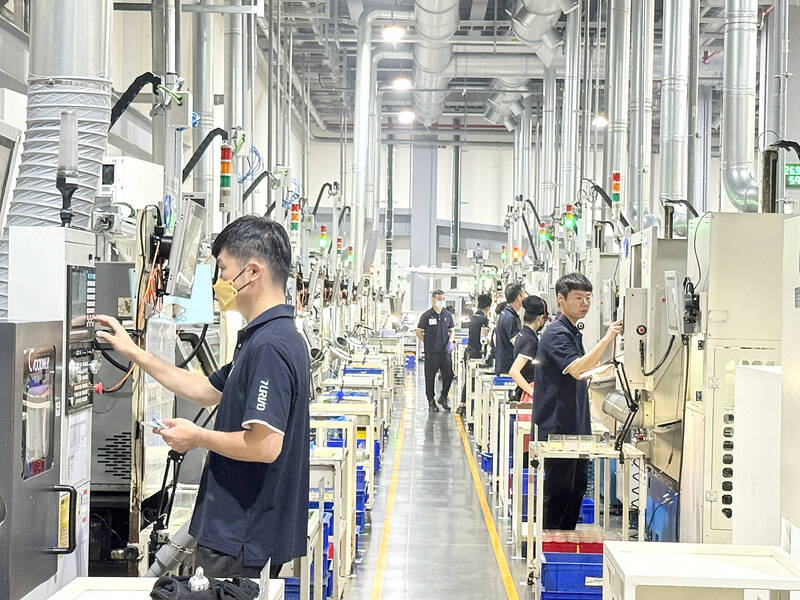The nation’s manufacturing sector is expected to see production value expand by 6.48 percent year-on-year to NT$25.9 trillion (US$798.2 billion) next year, driven by strong demand for artificial intelligence (AI) applications including drones and robots, the Industrial Technology Research Institute (ITRI, 工研院) said yesterday.
“The new wave of the AI boom is not only boosting demand for edge devices such as smartphones and AI PCs, but it is also stimulating new demand for diverse applications beyond servers,” Jeff Lin (林昭憲), director-general of the ITRI’s Industry, Science and Technology International Strategy Center, said at a media briefing in Taipei.
“Except semiconductors, we are seeing a growing trend that US and European vendors are turning to Taiwanese suppliers to source electronics like drones and robots,” Lin said.

Photo: Amy Yang, Taipei Times
Within the sector, the information technology (IT) industry is to see production value grow 10.33 percent next year, largely fueled by soaring demand for AI chips, the institute said.
The semiconductor industry’s production value is projected to increase 16.5 percent to NT$16.5 trillion next year, hitting a record high, it said.
The electronic components industry is expected to benefit from rising demand for high-end components used in servers and low-Earth-orbit devices, boosting production value by 7.5 percent to NT$2.4 trillion, the institute said.
In view of mounting pressure from US customers and Washington’s call for “made in America,” local component suppliers might prioritize production in the US, rather than in Southeast Asia, it said.
As global steel demand is expected to recover next year, the metal and machinery industry is to register a yearly increase of 3.54 percent in production value next year, the institute said.
This industry’s growth is also attributable to rising demand from semiconductor, aerospace and energy companies, it added.
The chemical industry’s production value is estimated to rise 2.42 percent next year on the back of recovering crude oil demand, and the livelihood sector — including the textile industry — is to grow 3.53 percent in production value, the ITRI said.
Consumers tend to spend more amid easing global inflation and lower interest rates, creating a favorable sentiment for local textile makers next year, it said.

Taiwan’s rapidly aging population is fueling a sharp increase in homes occupied solely by elderly people, a trend that is reshaping the nation’s housing market and social fabric, real-estate brokers said yesterday. About 850,000 residences were occupied by elderly people in the first quarter, including 655,000 that housed only one resident, the Ministry of the Interior said. The figures have nearly doubled from a decade earlier, Great Home Realty Co (大家房屋) said, as people aged 65 and older now make up 20.8 percent of the population. “The so-called silver tsunami represents more than just a demographic shift — it could fundamentally redefine the

The US government on Wednesday sanctioned more than two dozen companies in China, Turkey and the United Arab Emirates, including offshoots of a US chip firm, accusing the businesses of providing illicit support to Iran’s military or proxies. The US Department of Commerce included two subsidiaries of US-based chip distributor Arrow Electronics Inc (艾睿電子) on its so-called entity list published on the federal register for facilitating purchases by Iran’s proxies of US tech. Arrow spokesman John Hourigan said that the subsidiaries have been operating in full compliance with US export control regulations and his company is discussing with the US Bureau of

Businesses across the global semiconductor supply chain are bracing themselves for disruptions from an escalating trade war, after China imposed curbs on rare earth mineral exports and the US responded with additional tariffs and restrictions on software sales to the Asian nation. China’s restrictions, the most targeted move yet to limit supplies of rare earth materials, represent the first major attempt by Beijing to exercise long-arm jurisdiction over foreign companies to target the semiconductor industry, threatening to stall the chips powering the artificial intelligence (AI) boom. They prompted US President Donald Trump on Friday to announce that he would impose an additional

China Airlines Ltd (CAL, 中華航空) said it expects peak season effects in the fourth quarter to continue to boost demand for passenger flights and cargo services, after reporting its second-highest-ever September sales on Monday. The carrier said it posted NT$15.88 billion (US$517 million) in consolidated sales last month, trailing only September last year’s NT$16.01 billion. Last month, CAL generated NT$8.77 billion from its passenger flights and NT$5.37 billion from cargo services, it said. In the first nine months of this year, the carrier posted NT$154.93 billion in cumulative sales, up 2.62 percent from a year earlier, marking the second-highest level for the January-September